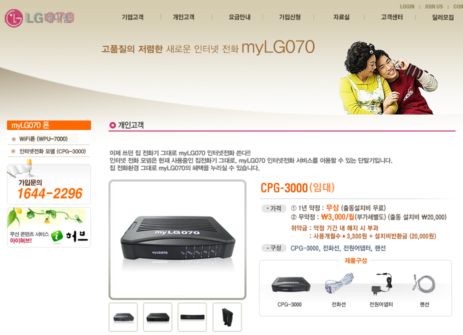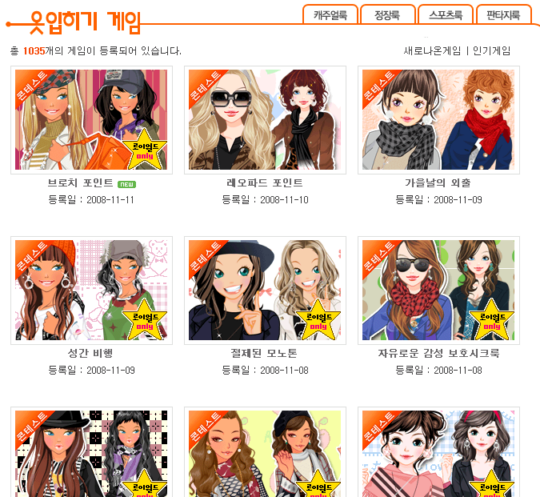In Korea, LG Dacom is the biggest market player - obviously it's part of the LG conglomerate. Other big conglomerates, such as Samsung, SK, KT (Korea Telecom) are all in this market, making the still nascent market very crowded.
Internet phone service providers now provide what they call "number portability", meaning users can use existing phone numbers even if they switch to VoIP service, or switch among different VoIP service providers. If you can continue using the same phone number while just saving money, switching over quickly becomes a no brainer. Among internet phone users, calls are free unlimited; Outbound calls can be cheaper by up to 80%.
This got me thinking that even under difficult financial times, good internet business models can win new customers and thrive - especially those that can help customers save money or time. That said, I haven't seen many new web services in Korea/Asia that allow me to do just that. Come on, entrepreneurs! :)
According to some Korean news articles (which quote from Japan's Nippon Business Newspaper), Korean wireless carrier KTF is working on a new Android-based smartphone, in partnership with Japan's NTT Docomo.
KTF and NTT Docomo have set up a joint effort called Business & Technology Cooperation Committee, and the two companies together launched a phone model called FOMA L706ie in Japan.
As the smartphone market becomes too significant for carriers to simply look past (which had been pretty much their practice until the iPhone came around), apparently Docomo and KTF have chosen to tackle the challenges together. This somehow reminds me of late-comer auto companies joining forces on some R&D efforts like hybrid engines.
What is not certain at this point is whether or not KTF is embracing Android at the expense of ditching its long-rumored iPhone plans. It would be cool if KTF launches both the iPhone and Android-based phones together. After all, Korean market remains one of only few markets sans iPhone despite market needs (at least by the high end users), and this is a rather prominent market void to be filled.
Real Name Verification asks all users to verify their real-world identity before making any user content on the web - blogs, wikis, photos, videos, or even comments. Users won't be required to use their real names as their IDs, but still they have to verify their particular online ID is mapped onto their real name.
So it's like this: If you are lonelygirl15, and if you want to upload your videos on Youtube, you can still appear as lonelygirl15 but you gotta tell Youtube that you are actually Jane Doe (or whatever is your real world name) and your actual social security number is 123-45-678. "Hi lonelygirl15, would you mind if we check your real name and social security number before you proceed with the video clip upload?"
Guess what will happen if that mapping info gets hacked (guessing who in the world fake Steve Jobs might be will be the thing of the past); or if someone steals your real name and social security number, and acts online as if he was you - this time, with more (false) credibility.
This requirement applies to anonymous comments as well - if you want to leave an anonymous comment to someone's blog, you should still have to go through real name verification process. This will make Korea the first country in the world that invented the term, "real name verified alias" - isn't that a self-contradictory term?
The purpose of this mandate could be pretty noble (or so I hope) - to discourage those dangerous evil trollings. But what if the government starts to use this feature to hunt down whoever makes anti-government-ish comments (whose definition can sometimes be blurry). Or use this mandate as a way to deter people from making any criticism on the current government. ("Hey dude, we know who you are, so you probably don't want to mess with us the officers.")
The general industry consensus towards this real name verification thing is pretty bad. Folks are afraid the government might be turning the clock back. It could come from a noble cause, but it may not be the cleverest solution. I'm all for introducing measures to deter trolling, but asking all internet users to go through real name verification for all types of user generated content sounds a bit too extreme/unproductive to me. After hard thoughts, we as the society as a whole might indeed end up concluding the real name verification is the best thing out there against trolling, But still the question remains: Have we thought about it hard enough, as hard as we possibly can?
TAG real name verification
Roiworld is a flash game/community that lets users (mostly young girls) dress avatars with a given set of fashion items. Once the "donning" is done, users can participate in contest ("whose avatar is most chic") or share the looks with others who can then comment on them.
Roiworld's English website says it will launch in the US in January 2009, but there is no sneak previews available. But I assume the US service won't be too different from the current Korean service, and for those who can't check out the Korean service due to language barrier, here are some screen grabs for you.
The main service of Roiworld is "dress-up game". Users can first choose different fashion genres (casual looks, sporty looks, etc) by choosing a category. Under each category, there are hundreds of different "dress-up games" available.
For example, if you choose "casual looks" category, there are 1,035 "dress up games" available. One of them is "Leopard" dress up game, apparently suggesting the fashion items with which user can dress up the avatar are themed "Leopard prints." Click to choose the game, and you're led to a flash-based screen like this (I didn't download anything so it's 100% browser based, and it ran well on Chrome).
So this is like a blank canvas you can start working on, and obviously some fashionista girls would be excited at this point, with the anticipation of dressing up the avatar girl as they wish - well, that's not like guys, who are normally excited with the idea of undressing a girl. :)
Donning the avatar is a simple drag and drop experience - but I wish there was a "sticky effect" i.e. if I take an item near the matching body parts, the item would just stick in there. But even without the feature it was relatively easy to dress up the avatar - even someone like myself who doesn't possess any fashion sense could create this decent-looking avatar in under a minute.
Roiworld offers the same features for the "Make up game" as well - obviously, the makeup would be another area girls are obssessed about all the time. It's also drag and drop experience.
More interesting to me was the "I'm also a designer" section, where girls could post their hand-picked collections for a given fashion theme. For example, the following is someone's posting under "Elegant, red looks". Imagine what will happen when something like this is connected to real e-commerce (which isn't the case for the time being).
Speaking of e-commerce potential, the dress-up or makeup game could also be very powerful when they are connected with e-commerce. Users can complete looks, share them, and perhaps get affiliate commissions when other users buy the actual items that are part of those looks.
I think services like Roiworld have global appeal, as girls are interested in fashion and looks everywhere in the world. If done right, Roiworld could be one of few services that originated from Korea/Asia and end up being a successful global service.
Korea's leading games company... turning into a family business?
Other | 2008/11/05 14:38 | Web 2.0 Asia
Songyee Yoon is little known outside of Korea, but she's quite a figure in the nation. She became the youngest VP at SK Telecom, a huge telco, at a mere age of 28. This was after getting her PhD from MIT at 24 and working at McKinsey. (Hey, what the heck was I doing at 24?)
Think of her as Korea's Marissa Mayer - the two share many traits such as being smart, good looking, and being on the fast lane at a successful tech company.
Now, add to that "having dated with a founder of a $1bn+ company" - Marissa with Larry, Songyee with NC Soft founder/CEO TJ Kim. (NC Soft is Korea's leading online games company, famous for its Lineage online MMORPG games.) Perhaps a difference there is that Songyee eventually got the ring, while Marissa didn't yet. (Songyee and TJ Kim got married in fall last year.)
With the inks on their nuptual agreements barely dry, Yoon is coming on board at her husband's company, NC Soft, as Chief Strategy Officer. Yoon has thick grey matters, no doubt about it, but I don't know if NC Soft and Yoon, whose specialty lies in artificial intelligence, can be the best fit. Besides, Yoon's joining the company essentailly makes NC Soft a family business (doesn't it?), and I don't think I have seen that many successful internet companies that are essentially family businesses.
I'm just hoping the couple, both super smart, will let the creativities of other NC-ers blossom as well as flexing their own creative muscles. Last thing they want is to create two hurdles to overcome/convince, instead of just one.
Barry Diller, IAC president, is a hall-of-famer in the internet media industry. (Or, if I may use an extremely obscene American slang, he's a big swinging dick.) IAC (Interactive Corp) is an internet services mega-store which has brands like Home shopping network, Ask.com, Ticketmaster.com, Match.com, Citysearch, and Expedia under its umbrella. (Expedia has been spun off recently.) Barry is definitely another person you can't get to meet every day.
Couple days ago, I was fortunate enough to be invited to the “roundtable talks” hosted by Mr Diller, who visited Seoul in an exploratory trip. Also invited were about 10 Korean web entrepreneurs and bloggers including my pal Danny, Mr. Peter Kim (the CEO of Pandora - leading online video service provider in Korea), and Nexon VP Jimmy Kim (who recently spoke at Open Web Asia).
Barry admitted he doesn’t know much about Korea other than that the country has a pretty advanced web and mobile service infrastructure. But after the roundtable talks, Barry was pretty impressed by some of the stories we told him about what’s happening in Korea – including stories like the X-file, the secret Powerpoint file with all kinds of dirty-laundry secrets of Korean entertainers, which had somehow been leaked to the public in 2006 and was viewed by more than 60% of all Korean internet population within the next 24 hours, proving how "connected" the Korean society is.
During the roundtable, Barry said more than ten times “Capable companies - come to NYC and see our team”. Being in the game for long enough, I can tell what’s lip service and what’s not, and I can tell you this one is closer to the latter. So if you believe you are a truly capable company, preferably with some numbers to prove yourself, you can give a cold call to IAC and chances are they will at least take a look at you. But given their time is a scarce resource, you better be good, not just Quixotic. If you need an intro, I’d be happy to provide one.
TAG Barry Diller, IAC
Cyworld is finally pulling plugs from the US market. (Link in Korean.) Cyworld US launched in August 2006 - I still remember Wired print magazine doing a major coverage saying something like, "Myspace is doomed now." It now turns out that the prediction was widely off the mark.
Cause of failure? Well, for starters (the obvious ones): Cyworld didn't seem to have sharp strategies as to how to position their service (Was it Myspace or Habbo hotel?); They didn't localize the service very well; SK Telecom, the parent company, didn't "get it" yet still tried to put a grip on the business.
The majority of Cyworld users in the US have been Korean teens studying abroad in the US or Korean-American teens, making Cyworld still largely a Korea-specific social network. This puts a very clear limit to the service's growth. But at least among the Koreans, Cyworld still seems to be the king of social network. It's time for Korean web entrepreneurs to step up and build a Post-Cyworld service - and the recession can be a good time for one to keep heads down and work on such a project under the radar. If the hypothetical post-Cyworld does come out, I hope it will be something that's easier to localize than Cyworld has been.











